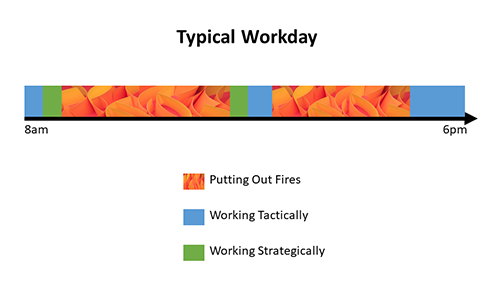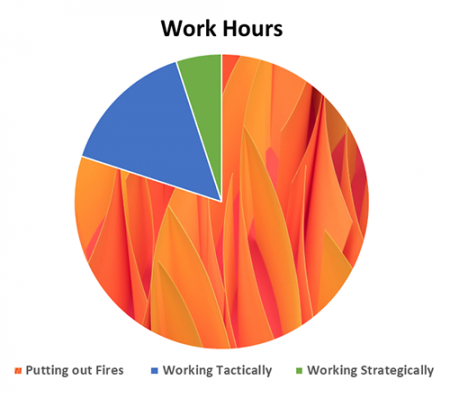Stop Focusing on Fires
By Mike Raia ![]() | Published July 27, 2020
| Published July 27, 2020
"I'm Putting Out Fires!"
We've all said it and heard it. Fires make us late for meetings, work until dark, and fall behind our regular work. A percentage of fires are unavoidable because things go wrong and that's life. However, a percentage of fires are avoidable but persist because while we'd like to take some time and solve the root cause once and for all, we're too busy, well...putting out fires.
Now, let's step back and consider the nature of work and come back to the topic of putting out fires.
Breaking Down Work
When you think about the work you perform on a daily basis, it probably falls into two categories:
Tactical work
This is the operation of your department or business. The daily tasks you perform to keep things functioning like managing invoices, solving customer issues, fulfilling requests, etc.
Most tactical work can be standardized and codified. Do this, then do that, then do this. A new person could come in and perform these kinds of tasks fairly easily.
Strategic work
This is the forward-thinking, directional work you do to improve, grow, and align the business. This could mean coming up with new products, developing process improvements, discovering new markets, etc.
Most strategic work is hard to standardize. You might have to say "Think about this, then consider that." A new person would need some time and/or previous experience to be successful.
An Example of Tactical Vs. Strategic Work
Most jobs have a combination of both these types of work and the two feed each other. Let's look at an example.
A Finance Manager at a large manufacturing company is responsible for handling internal requests for capital and operational expenses. Departments contact her when they need additional money for machine repairs, construction, new equipment, etc.
A lot of her job is reviewing emails, responding, entering data into the ERP system, meeting with the Finance Director to discuss open projects, and creating reports. These are all tactical tasks and are absolutely necessary for the proper functioning of the department and the business.
Periodically, the Finance Director asks her to spend some time thinking strategically about her job and the service she provides. This means asking questions like:
- How well does the request and approval process work? Is it efficient?
- What more could we be doing for our internal customers to help them succeed?
- Are there other internal customers we could be helping?
This is the kind of work most of us would like to be doing. Using our creativity and acumen to solve problems and make things better. The reality is most businesses and departments split time across three different areas in different measures.
Our Daily Focus
Each day we spend our time in three basic groups of work:
- Managing Fire Drills
- Working Tactically
- Working Strategically
Let's break it down for a typical workday.
 This "schedule" may look familiar to you. You come in at 8am and finish up some lingering tasks from the day before. You start to plan out your day, think about longer-term goals, take some notes, and...FIRE!
This "schedule" may look familiar to you. You come in at 8am and finish up some lingering tasks from the day before. You start to plan out your day, think about longer-term goals, take some notes, and...FIRE!
You put out fires until lunch and take a breather or you skip lunch but have to wait on someone else. You take the time to try to finish up your strategic thoughts but realize you're way behind on your regular work, which you start in earnest, but then the fire rolls back in and incinerates your afternoon.
You stay a little late to catch up on your regular work and head home for the day. The strategic work is now far in your rearview mirror.
Here's how your day, and your time at work in general might look.

Why so many fires?
There is usually more than one reason why a fire drill is needed, but these are a few common ones.
Procrastination
Procrastination is not a habit we tend to break as we get older. We may procrastinate less, or in a more focused way, but we all still do it. The solution is to prepare for your day better and stick to your schedule.
For some good ideas on how to do this, read these posts.
Poor Planning
Not everyone is a natural planner and sometimes "overplanning" can rub people the wrong way. But the fact is that while working by the seat of your pants may be fun for some, it's a bad way to work.
We wrote a lengthy article called "How to Plan" and that can help you put on your Planning Hat.
Not Enough "No's"
Politely saying "No" to coworkers when a fire erupts isn't easy. We all want to pitch in and help the team, however that's not the same as saying "Yes" anytime someone comes to you with a problem. Saying "Yes" means saying "No" to something else. Often that something else is more important and relevant to your role than the fire you're being drawn into.
Fortunately, a lot has been written on the topic of saying "No," here are a few.
Inconsistent Standards and Processes
Consider this quote.
"When everything is an exception, there is no process."
Many companies and departments struggle mightily with creating standards and processes. Sometimes there's an innate organizational resistance to process because the culture prefers "Cowboy Rule," other times it could be a lack of capacity, knowledge, or agreement about how to do it.
We have a lot of resources (and a great platform!) for finally sitting down and creating standards and processes in your organization.
Solution Summary
Stop and take a collective breath. No one wants to be putting out fires all day, every day. Everyone wants to do quality, value-adding work as much as possible.
- Recognize the problems causing fires, individual and organizational.
- Break the cycle of "seat of the pants" work and teach everyone to plan better.
- Focus on improving standards, processes, and compliance.
- Deploy process automation to reduce mistakes and improve efficiency
Tags
stress putting out fires work procrastination
Categories
Business Ideas Productivity Tips Workflow Ideas

Mike Raia
Marketing the world's best workflow automation software and drinking way too much coffee. Connect with me on LinkedIn at https://www.linkedin.com/in/michaelraia/